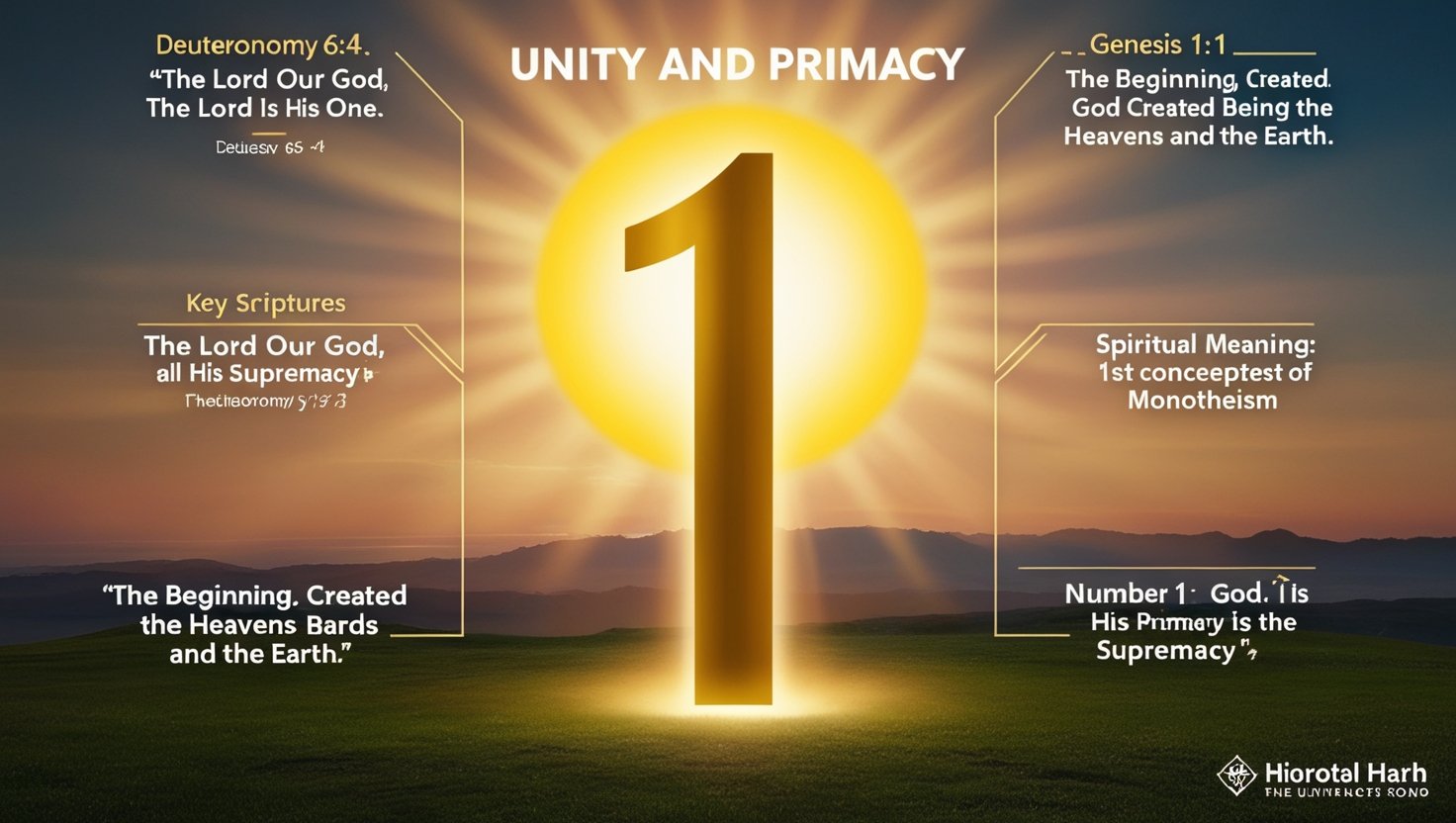Biblical Numerology: The Profound Significance of the Number One
Biblical Numerology: The Profound Significance of the Number One. Biblical numerology, the study of numbers in scripture, reveals layers of symbolic meaning that extend far beyond their literal interpretation. Among the many numbers imbued with spiritual significance, the number one holds a uniquely profound place. It embodies unity, primacy, and the singularity of God, serving as a cornerstone for understanding key theological principles within the Bible.
https://divinetruthofnumbers.com/biblical-significance-the-number-zero-0/
The Symbolism of Number One
The number one in the Bible is a powerful symbol of unity, beginning, and indivisibility. Its meaning resonates across both the Old and New Testaments, reflecting the foundational aspects of faith and the divine order.
Unity and Monotheism
At its core, the number one symbolizes unity and oneness, particularly with regard to the nature of God. This is famously encapsulated in the Shema, a central declaration of Jewish faith:
"Hear, O Israel: The Lord our God, the Lord is one" (Deuteronomy 6:4).
This statement emphasizes the monotheistic essence of the Bible, asserting the singularity of God. It sets biblical faith apart from polytheistic traditions, establishing the belief in one supreme deity who is sovereign over all creation.
The theme of unity extends to the New Testament, where the Church is described as one body united in Christ:
"There is one body and one Spirit, just as you were called to one hope when you were called; one Lord, one faith, one baptism; one God and Father of all" (Ephesians 4:4-6).
This passage underscores the spiritual oneness of believers, rooted in their shared connection to Christ and the Holy Spirit.

Primacy and Beginnings
The number one often signifies primacy and the idea of being first or foundational. In the creation narrative of Genesis, the very first verse introduces God as the origin of all things:
"In the beginning, God created the heavens and the earth" (Genesis 1:1).
This verse illustrates the primacy of God in the universe, presenting Him as the ultimate source of existence. The first act of creation—bringing light into being on the first day—marks the beginning of divine order and purpose.
The theme of beginnings continues in the New Testament with the concept of a “new creation” through faith in Christ. This spiritual renewal signifies the transformative power of God, initiating a fresh start for humanity.
Indivisibility and Wholeness
Another key aspect of the number one is its representation of indivisibility and wholeness. Theologically, this can be seen in the relationship between Christ and the Church. Believers, though diverse in background and gifts, are united as one body under one Spirit:
"For just as each of us has one body with many members, and these members do not all have the same function, so in Christ we, though many, form one body" (Romans 12:4-5).
This indivisibility reflects the holistic nature of God’s design, where all parts are interconnected and work harmoniously within the greater whole.
Singular Authority and Leadership
The number one also signifies singular authority, particularly in relation to God’s unmatched sovereignty. Throughout scripture, God is portrayed as the supreme ruler with no rival or equal. The first commandment in the Ten Commandments exemplifies this:
"You shall have no other gods before me" (Exodus 20:3).
This directive underscores the exclusivity of worship owed to God alone, affirming His unique position as the one true deity. Similarly, the New Testament highlights Jesus as the “one and only Son,” emphasizing His singular role in salvation:
"For God so loved the world that He gave His one and only Son, that whoever believes in Him shall not perish but have eternal life" (John 3:16).
Here, the number one signifies Christ’s unique authority and mission as the mediator between humanity and God.
Key Biblical References to the Number One
The prominence of the number one is woven throughout scripture, appearing in key passages that underscore its symbolic importance:
Genesis 1:1: "In the beginning, God created the heavens and the earth."
This verse highlights God as the first cause and the initiator of all creation.
Deuteronomy 6:4: "Hear, O Israel: The Lord our God, the Lord is one."
A declaration of monotheism and the unity of God.
Ephesians 4:4-6: "One body, one Spirit, one hope, one Lord, one faith, one baptism, one God and Father of all."
A powerful affirmation of spiritual unity among believers.
John 3:16: "For God so loved the world that He gave His one and only Son."
A testament to Christ’s unique and unparalleled role in salvation.

Theological Insights from the Number One
The study of the number one in biblical numerology reveals profound theological insights:
Monotheism: It reinforces the belief in one God who is sovereign, eternal, and unchanging.
Divine Primacy: It underscores God’s role as the first and ultimate cause of existence.
Spiritual Unity: It calls believers to unity in their faith, reflecting the oneness of God.
Exclusivity of Worship: It reminds followers of the singular devotion owed to God.
Christ’s Uniqueness: It highlights the singularity of Jesus’ mission and His central role in salvation.
Conclusion
The number one in biblical numerology is far more than a mere digit; it is a profound symbol of unity, primacy, and divine singularity. From the oneness of God in Deuteronomy to the unity of believers in Christ described in Ephesians, the themes associated with this number resonate throughout scripture.
By understanding the symbolic meaning of the number one, we gain deeper insights into the core beliefs of biblical theology. It reminds us of God’s unmatched sovereignty, the beginnings of creation, and the call to unity among His followers. The specialty of the number one is a testament to the interconnectedness of biblical teachings and the enduring significance of its message.
Through this lens, the number one becomes not just a numerical figure, but a gateway to understanding the profound truths of faith and the divine order of the universe.

BIBLICAL NUMEROLOGY:
Specialty of Number One
Biblical numerology is the study of numbers within the Bible, which often carries symbolic significance beyond their literal meaning. One of the most fundamental numbers in this context is the number one, which is deeply embedded in the biblical narrative and holds a unique position in Christian theology.
Symbolism of Number One
Biblical numerology is a fascinating study that assigns spiritual significance to numbers found within the scriptures. Among these numbers, the number one holds a particularly profound position, symbolizing unity, primacy, and the singularity of God. This article will delve into the specialty of the number one in biblical numerology and explore its multifaceted meanings.
The number one symbolizes unity, primacy, and the beginning. It is often associated with God Himself, representing His sovereignty and singular nature. Here are some key aspects of the number one in biblical terms:

Unity and Monotheism
In biblical texts, the number one is often associated with the idea of unity. It represents God’s oneness, emphasizing the monotheistic nature of Christianity and Judaism. The Shema, a traditional Jewish prayer found in Deuteronomy 6:4, declares, “Hear, O Israel: The Lord our God, the Lord is one.” This verse underscores the central belief in one God, highlighting the interconnectedness of divine attributes.
In biblical teachings, the number one is synonymous with the concept of monotheism, the belief in a single, allpowerful God. This is clearly articulated in the Shema, a traditional Jewish prayer found in Deuteronomy 6:4:
“Hear, O Israel: The Lord our God, the Lord is one.”
This verse emphasizes the uniqueness and unity of God, distinguishing the faith from polytheistic beliefs.
Primacy and Importance
This concept of beginnings is further exemplified in the biblical concept of a “new creation” in Christ, as described in the New Testament.
The number one also signifies primacy and importance. It often represents the first, the best, or the most significant. For instance, in the Ten Commandments, the first commandment instructs believers to have no other gods before the one true God, highlighting the priority of God in the lives of His followers.
Beginnings and Creation
The number one also signifies primacy and beginnings. In the Book of Genesis, the creation story starts with “In the beginning, God created the heavens and the earth,” marking the commencement of the universe. The use of the number one here signifies the first step in God’s grand design, setting the stage for all subsequent creation.
In the creation narrative of Genesis, the number one signifies the beginning of everything. God created light on the first day, marking the start of creation. This association with inception and new beginnings underscores the transformative power of God’s word.
Examples of Number One in the Bible
- Genesis 1:1 “In the beginning, God created the heavens and the earth.” This verse highlights the number one’s association with the start of the universe.
- John 1:1 “In the beginning was the Word, and the Word was with God, and the Word was God.” Here, one again emphasizes the unity and divine nature of God and His Word.
- Ephesians 4:46 This passage speaks of one body, one spirit, one hope, one Lord, one faith, one baptism, and one God, underscoring the oneness of the Christian faith and its community.
Indivisibility and Wholeness
Another aspect of the number one’s specialty is its representation of indivisibility and wholeness. In biblical terms, this can be seen in the relationship between Christ and the Church. Ephesians 4:46 speaks of one body, one Spirit, and one hope, emphasizing the complete and undivided nature of the faithful community. This reflects the idea that believers, though many, are united as one in Christ.
Singular Authority
The number one is also indicative of singular authority and leadership in the Bible. Throughout scripture, God is portrayed as the ultimate authority, with no equal or rival. Similarly, Jesus is described as the “one and only Son” in John 3:16, emphasizing His unparalleled role in salvation and His unique position as the mediator between God and humanity.
Key Biblical References
Genesis 1:1 The beginning of creation, illustrating the foundational aspect of the number one.
Deuteronomy 6:4 The Shema, highlighting the oneness of God.
Ephesians 4:46 The unity of the Church as one body.
John 3:16 Jesus as the “one and only Son.”
Biblical Numerology: The Specialty of Number One
Biblical numerology is the study of numbers in the Bible, often holding symbolic significance. The number one holds a unique and profound place in this context, representing unity, primacy, and the singularity of God.
Unity and Singularity
In biblical terms, the number one often symbolizes the unity and singular nature of God. This is encapsulated in the Shema, a central declaration of the Jewish faith found in Deuteronomy 6:4: “Hear, O Israel: The Lord our God, the Lord is one.” This affirmation underscores the monotheistic essence of the Bible, emphasizing that there is only one true God.
Primacy and Supremacy
The number one also signifies primacy and supremacy. It denotes a position of being first or primary. In the creation narrative, God is described as the first cause, the origin of all things. Genesis 1:1 states, “In the beginning, God created the heavens and the earth.” Here, God is depicted as the supreme being who initiates creation, establishing His authority and precedence over all creation.
Oneness in Christ
In the New Testament, the concept of oneness extends to the relationship between believers and Christ. Ephesians 4:46 speaks of one body and one Spirit, emphasizing unity among believers in their faith and connection to Christ. This underscores the idea that just as God is one, His followers are called to be united as one body in Christ.
The First Commandment
The importance of the number one is also reflected in the Ten Commandments, where the first commandment states, “You shall have no other gods before me” (Exodus 20:3). This commandment highlights the exclusivity of worship and devotion owed to God alone, reinforcing His solitary and unmatched divinity.
Conclusion
In biblical numerology, the number one holds great significance, symbolizing unity, primacy, and the unmatched sovereignty of God. It underscores the foundational belief in monotheism, the supremacy of God in creation, and the call for unity among believers. Understanding the symbolic meaning of one enriches the spiritual and theological insights drawn from the Bible, illustrating the profound depth and interconnectedness of its teachings.
The Number One
In biblical numerology, the number one is imbued with deep spiritual significance. It represents unity, the beginning, indivisibility, and singular authority. These themes are woven throughout both the Old and New Testaments, underscoring the number one’s pivotal role in conveying key theological concepts. Understanding the specialty of number one can enrich one’s appreciation of biblical texts and the profound messages they convey.
The number one in biblical numerology carries profound significance. It encapsulates themes of unity, the primacy of God, and the inception of creation. By understanding the symbolic nature of the number one, we gain deeper insight into the foundational beliefs of biblical theology and the overarching narrative of the scriptures.
https://biblenumerology.in/bible-ankashaastr-mein-12-mahatvapoorn-sankhyae/




